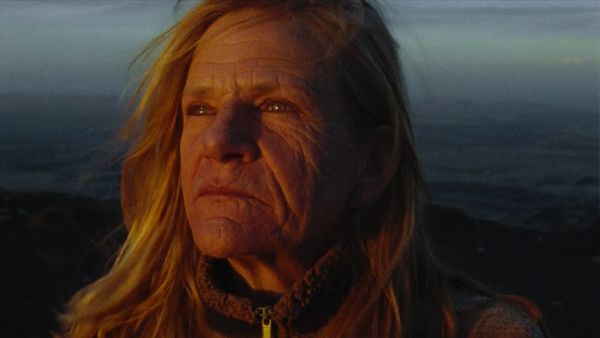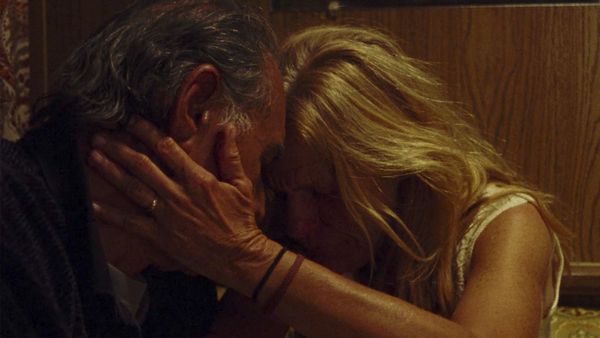How did it feel, after making your presence felt in so many supporting roles, to finally get your teeth into a big part like this?
Dale Dickey: I was very lucky that Mr Max sent me a beautiful letter about this film. And yes, I've had a career as a character actress - I pop in and out and I'm always supporting, and I love their meaty roles, and I've done a lot of lead roles on stage because I've done a lot of theatre, but never on film. I knew from the script, I had to do it. Once I met Max, I was just blown away by everything with him, his intellect, his passion, his kindness - I had to do it. I was terrified, I have to admit, I was really scared about my face being on camera that much as insecurities came into play, and whether I was capable of carrying a film. But I was in such good hands and I laid out my insecurities to Max. Max is such a special director. He's gentle, he's specific and he really was like my tour guide.
Did it even help you that you were a bit nervous? Because the film is all about being a bit tentative, maybe being a little bit anxious as a character.
DD: Yeah, particularly when Lito comes in. All of a sudden, I don’t think it matters how old we are, this girlishness, giddiness comes in, when you're sparked by someone who was in the past. I have struggled for a long time as an actress because I play so many animated, eccentric characters. And Faye is simple and direct and straightforward. And I haven't really had the chance to work on those roles. I see other actresses who just say so much without doing anything and I have a very animated face anyway, as you can tell. So it was really terrific to get to see if I could I could accomplish that. And I think Max really helped. I trusted him to let me know, when it was too much. And so it was a wonderful challenge and growing experience for me as an actress to have had this lead, and if I never have another one again, I will die happy because this was a piece of my heart, just like his.
There’s a lot of quietness in the film, because there's an awful lot of listening going on, whether it's listening to birdsong in the morning, or turning on the radio and listening to that. Did being within the quietness help you develop that character and the thoughtfulness that goes with her because ultimately, she's listening to?
DD: As far as the nature goes, I grew up in Tennessee and from being a little kid both my parents had us up in the mountains hiking. I lived in New York for many years, before I went to LA and I craved solitude, I would find a church just to sit in or go to the Central Park. We get out of LA as much as we can, my husband and I, we go camping. It's not just re-energising but it's the time that I feel I can be with myself, I can be with my God or whatever is up there. If you just listen and you listen to nature, it feeds you, It's very much part of who I am and I think for Faye, she has lived in that quiet for so long, that all of these sounds - the water the mountains, the leaves - they only fuel introspection. When you're by yourself… I was in quarantine in New Zealand for two weeks in a motel room before I filmed and I thought, ‘I do not want to be with myself any longer it is too crazy in there’. But for Faye, Faye was not Dale, it's what she needs. She likes that solitude and that quiet. And being able to film outdoors area , it just instantly creates the world. It was beautiful, nothing fake. It was all right there.
And there's something about being in that space and landscape where you realise how tiny we are, how precious every little thing is, so you're never quite alone. You're surrounded by all these wonderful, magnificent things that the power greater than us has put there. And they become your friends, in essence. I had a friend who said, ‘If you listen, the trees are talking to each other’ and now when I'm in a forest and I hear them I try to imagine what are they saying? What you know? Yeah, I'm a tree hugger, I believe in energy, I’m a lot like Faye in that way, but I can't fix a car that's for sure. I can change a tire.
How was working with Wes Studi?
DD: I'd never met Wes before, and I have to say, I can remember seeing Dances With Wolves, of course. And The Last Of The Mohicans, he terrified me in The Last Of The Mohicans. We actually shared one of the ranch houses together in our bubble. And I figured we'd get along okay but we actually got along really well - we liked the same things on TV, we'd get off and we’d have a glass of wine and TV ad it just felt natural. We chose not to talk too much about the history of the characters, because we were supposed to be estranged and we wanted to keep that distance. But he’s also played a lot of rough characters sort of like I had, so I had not seen this gentler side and it's, it's so genuine and so sweet. And now when I watched the movie several times, he has these two moments when he's talking about his wife, Shirley, and both line readings are like, he'll talk about her and then he goes, ‘And that's what she did’. It breaks my heart. He does it twice. And I didn't realise in the filming aspect, how moving it was, but now watching him, I just think he's lovely.
You’ve said in other interviews that you’d never had an onscreen kiss before the one here – did that also help in terms of conveying the character’s nervousness?
DD: No matter what age you get to, I think there's that romantic spark. Wes and I were both nervous. I think Wes was way more nervous than I was. I had done a couple of kisses but they were not this kind of kiss. Like, I did this weird mother/son kiss in his bad movie. Creepy. And then I had this sloppy, drunken bar whore kiss. This was intimate and real. And I remember after Wes and I got back to the house that night, we were having a glass of wine and talking about it. There was sort of this quiet. And Wes looked at me and he went, ‘Did we just lip lock today?’, and I went, ‘We did’, and we realised it was both of our first times so it made it really special and sweet, particularly middle-aged people, you don't get to see that. It’s a really cool, unique thing. There's a lot of middle-aged people looking for love after loss in their lives. And that romantic physical desire does not go away.























